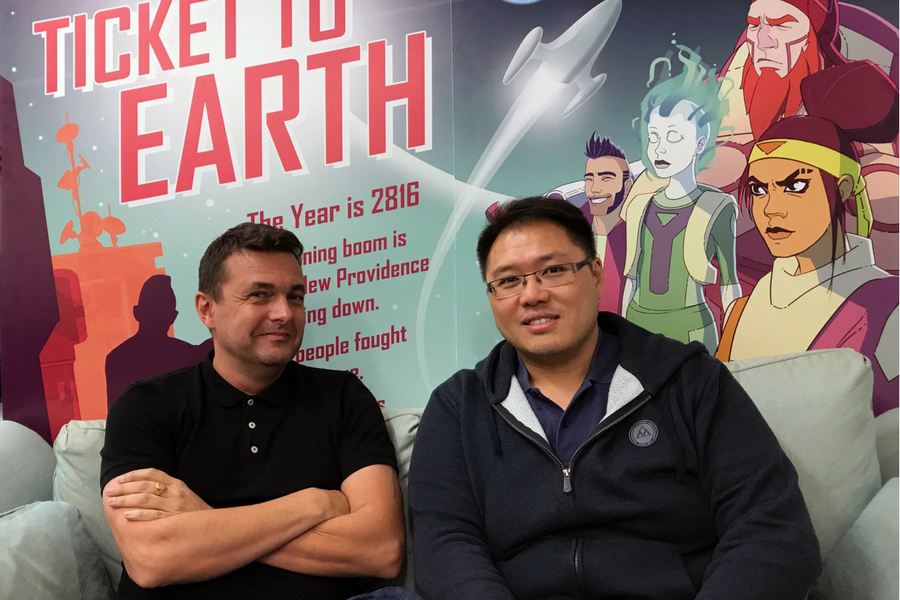If you’ve taken a stroll across an iTunes or Android mobile game store recently, then you’ve likely been exposed to the plethora of Candy Crush and Flappy Bird lookalikes flooding every ‘recommended’ list and search result.
Gaming apps currently make up roughly 25 percent of the iTunes store’s applications, the highest of any category – which means coming up with an innovative game isn’t exactly the easiest task for a developer of any size.
For Kevin Chan and Nick Hagger, founders of mobile-focused indie game startup Robot Circus, innovating in the mobile space meant looking towards developing engaging titles that would serve as a social enterprise.
“We started our company in 2012, with the idea of doing a mixture of business service work that would allow us to generate revenue,” said Hagger.
“We looked at a type of social enterprise model, making things that we feel good about and that would help improve the world. We looked to put our games in a space that we thought didn’t have a huge area of competition, and that was educational games, games that could go straight into classrooms.”
Describing themselves as an “adorable but bitter old married couple”, the Robot Circus cofounders have worked together for a long time, dating back to an Australian studio called Bluetongue Entertainment, an international arm of global publisher THQ.
The pair worked within the studio from the mid 90s, working on console titles such as Jurassic Park and later De Blob. Suffering from the tailend impact of the global financial crisis, THQ closed its international offices in 2011, a move which would push Hagger and Chan to start their own business.
“That pushed us to restrategise opportunities around the mobile space. We realised we had a lot of learning it do in mobile, and we wanted to take our skills in building high quality, high production type products and bring it into a space that wasn’t too oversaturated [at the time],” said Hagger.
Moving from a “big family” studio production team to a compact startup would hold benefits, according to Hagger, who said it enabled the pair to flex their creativity and create their “own opportunities”.
“Projects move a lot slower there, sometimes taking two to three years,” said Chan.
“Big studio problems come from external reasons like money and timing, while the other part of it is internal problems like personalities,” added Hagger.
Working on passion projects, however, had to fall inline with maintaining a cash flow, so the founders developed a “process model” that would allow them to balance client work against their own personal projects. This would mean that Robot Circus would first look to create games in the rich educational app market thanks to a grant from Screen Australia, before moving over towards other genre titles.
“I think [a balance] is particularly important if you want to make interesting things but you don’t have a lot of backing to do that. For any startup that’s a challenge, but it’s all about maintaining cash flow and picking the projects you want to do, so you don’t feel like you’re interrupting the pillars you set up,” said Hagger.
“Making an entertainment game is hard because you never really know if you’re hitting the right notes, but with educational stuff we actually know what the audience can get out of it, so we can make something and really blow minds.”
Working beside the ABC, Robot Circus developed Q.E.D: Cosmo’s Casebook, an interactive roman history educational game where users play as a lawyer in ancient Rome looking to solve cases.
The startup also developed a music-adventure game titled Drumbeat Quest beside Holyoake, a non-profit organisation which focuses on therapeutic and learning programs through music.
Robot Circus also went on to develop other educational titles including Gobbling Goblins and Spellbook Academy, which gave the cofounders an opportunity to finance their own titles, beyond the education genre.
Finding an innovative game idea to work with, however, wasn’t exactly straightforward, and involved undergoing a process which Hagger compared to a non-gaming tech startup finding a market niche to work with.
“It’s a mixture of passion and personal; we wouldn’t be doing it if we didn’t like finding games ourselves,” he said.
“You begin to think, is this a game I want to play on the go or at home, and think about the feel of the game, then started making it around that. You kind of work out making an experience that fits that feeling,” added Chan.
The startup began developing Ticket to Earth, a puzzle and role playing game designed for mobile that combines an immersive narrative with strategy. The game was released into the app market in March alongside Apple’s indie game promotion, which would offer customers an exclusive section to look at indie games and help the title gain quick traction.
“There wasn’t a huge amount of development in this space. This genre lets people really invest in the characters, and really get to know them over a period of time,” said Hagger.
Split into ‘chapters’, or portions of the game that will be released over a period of time, (an increasingly popular trend for indie games entering the market), Ticket to Earth is now pushing for a release on PC, as the Robot Circus team works to release the addition chapters into the market.
Image: Nick Hagger & Kevin Chan. Source: Supplied.




















Trending
Daily startup news and insights, delivered to your inbox.